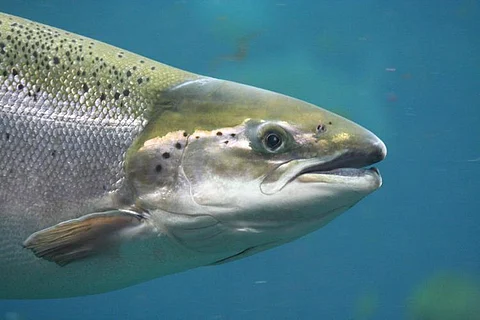

The study, which includes highly strategic scientific objectives for the salmon farming industry, will last five years and have a budget of GBP 8.5 million.
Photo: Landcatch Natural Selection.
The UK's largest salmon producer, Mowi Scotland, has partnered with experts from the Roslin Institute in a large-scale study aimed at increasing the productivity of farmed salmon by improving their welfare. The collaboration will last five years and has a budget of GBP 8.5 million (EUR 10.1 million / USD 10.5 million).
Funded through the BBSRC Business and Academia Prosperity Partnership program, the project is led by the Roslin Institute - which is part of the University of Edinburgh's Royal (Dick) School of Veterinary Studies -, but would be impossible without the collaboration of industry, in this case, Mowi Scotland.
During the research, experts will seek to understand how to limit the impact of chronic and complex diseases affecting the salmon farming sector, which in turn will lead to improved health and welfare. To do so, the team will use a variety of approaches and technologies to improve disease resistance throughout the salmon life cycle.
Thus, researchers will establish a world-leading framework for identifying regions of the salmon genome associated with complex diseases, using this knowledge to support the breeding of healthy populations.
"We seek to advance the fundamental understanding of fish health and robustness at multiple levels across the salmon life cycle, a proposal only possible through such a large-scale partnership with industry," explained Dr Nick Wade, from the Roslin Institute.
"The scientific objectives outlined are highly strategically relevant and deliver immediate translational opportunities to salmon production benefit the Scottish, UK and global salmon farming sectors, further increasing animal welfare, profitability, sustainability, and societal acceptance," added Professor Herve Migaud, Health, Welfare and Biology Director at Mowi.
In this search for a solution to limit the impact of chronic complex diseases in salmon farming, enabling better fish health and welfare, the research team will focus on the health of the fish heart and gills, using detailed studies of the species' DNA code, genes linked to key traits, and research into the immune system to improve resilience to disease throughout the fish lifecycle.
To do this, it will track hundreds of salmon families throughout the production cycle, focusing on key areas such as understanding genome diversity, the impact of early rearing practices, and the development of novel traits to select the most robust fish from the breeding population.
Likewise, scientists will investigate how rearing temperature during early fish development impacts the relationship between disease, immunity, and response to vaccination. They will also develop novel ways to separately measure disease resistance, tolerance, and infectivity as traits for robustness.
The five-year project involving research on the first dedicated Scottish salmon breeding population will be strengthened through the recruitment of key research positions, bidirectional career development support, and a program of community engagement to increase public awareness of their research.
This is not the first project with which Mowi Scotland is trying to raise awareness of the industry. In late summer, the company transformed its Inchmore Hatchery into a unique visitor experience to enable a range of stakeholders to learn more about the company and the aquaculture industry when they visit the facility.
